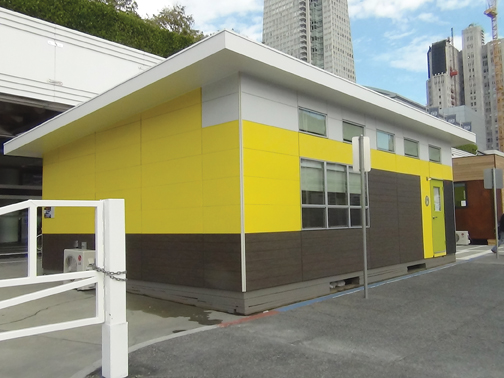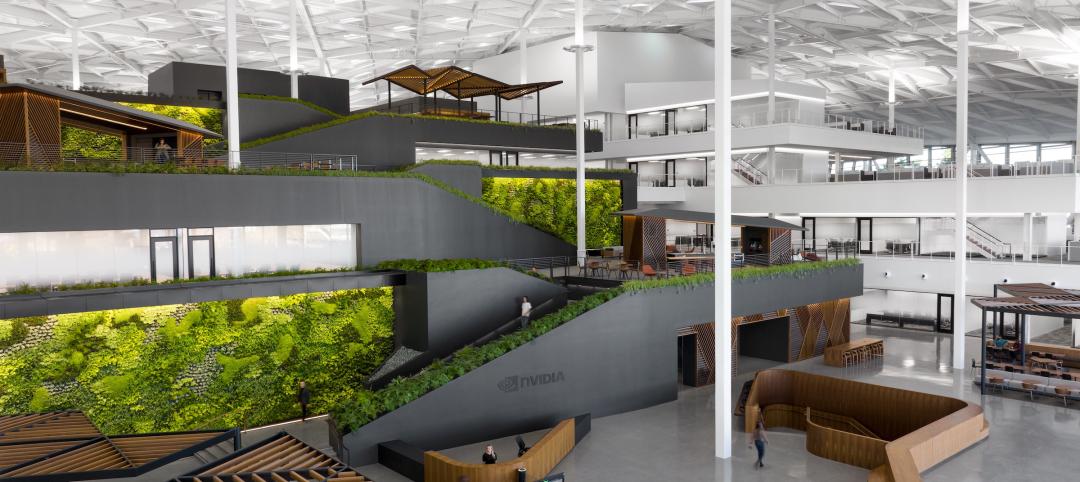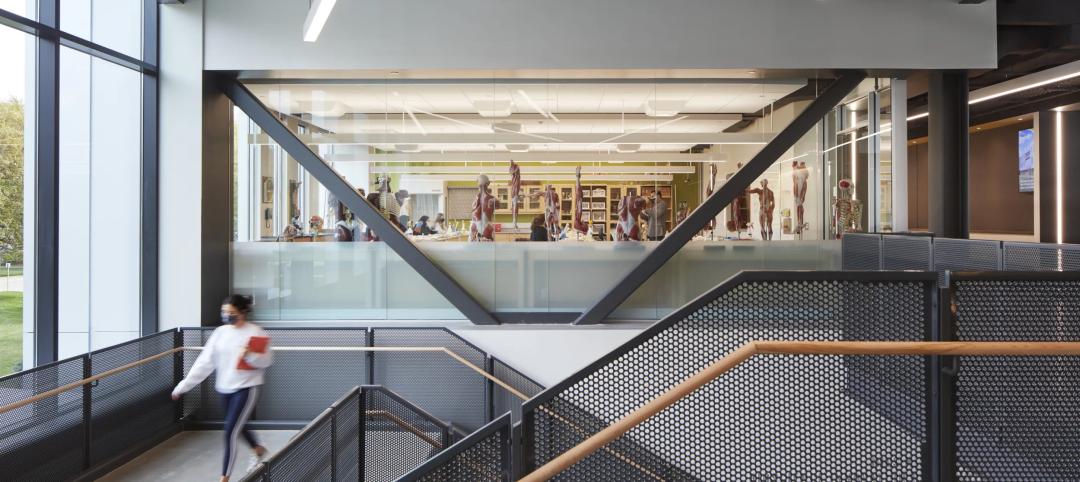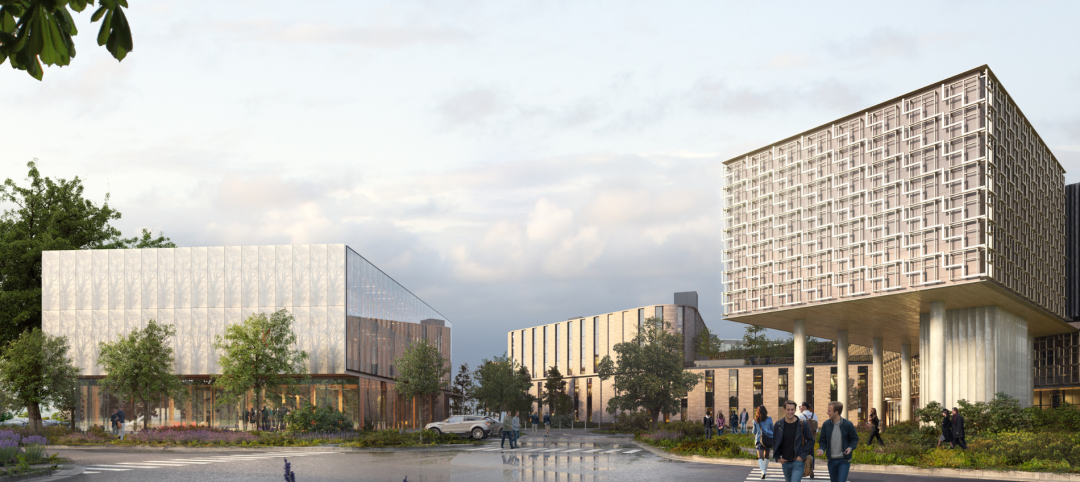At Greenbuild 2012, education and sustainability took center stage with the arrival of the SAGE modular classroom, designed and built by a team from Oregon. The demonstration facility, which was on display November 13-15 at the Moscone Center in San Francisco, was conceived and co-sponsored by Building Design+Construction and its parent organization, SGC Horizon LLC.
The genesis of the project came from the Department of Architecture at Portland (Ore.) State University, in particular Assistant Professor Margarette Leite. In examining the role of architecture in education spaces, she and her students recognized a growing need for sustainably designed classrooms nationwide.
While modular classrooms—or “portables,” as they’re commonly known—have been around for decades, some practitioners in the modular building industry feel they have not been used to their full potential. “School district administrators typically look at this kind of space as a temporary fix,” says Garth Haakenson, President/CEO of Pacific Mobile Structures, Chehalis, Wash. “But the reality is that these buildings stay up for 20 to 30 years. When they’re built to a minimum standard and not maintained over that time period, the quality of the classroom deteriorates and you have kids learning in a substandard environment.”
SETTING OUT ON A MISSION
With that historical background in mind, Leite and her students set about changing the design of modular classrooms—to create sustainably designed, factory-built classrooms that were good for children’s health and well-being, but also practical. “The only way to do that is to find a way to keep it affordable for school districts,” she said.
As the project began to pick up steam, the staff of Oregon Governor John Kitzhaber stepped in. The modular classroom was named an official “Oregon Solutions” project. This program, established in 2011, promotes “sustainable solutions to community-based problems that support economic, environmental, and community objectives, and are built through the collaborative efforts of businesses, government, and nonprofit organizations.”
With the governor’s backing secured and the project becoming more and more of a reality, the team grew to include Portland State’s College of Engineering, and Institute for Sustainable Solutions, in conjunction with AIA Portland. There was just one problem—the team didn’t have a buyer for the proposed classroom. “We were going to try and raise money for it if we had to,” said Leite. “Luckily a buyer stepped in and made it happen pretty quickly.”
That buyer was Haakenson and Pacific Mobile Structures, which has a branch in Oregon City, near Portland. With funding secured, modular builder Blazer Industries, Aumsville, Ore., got to work. “I think it was October 5 or so that we actually started construction,” said Kendra Cox, Blazer Industries’ Project Manager. “The building shipped [to San Francisco] November 9. We were working on the design, working on the pricing, every single last-minute item. It was pretty hectic.”
They called it SAGE, for Smart Academic Green Environment. The SAGE modular classroom came in at $77 a square foot in construction costs, about half that for conventionally designed and constructed “portables,” proving that sustainability and affordability were not incompatible.
THE CLASSROOM AS TEACHING TOOL
The shortage of high-quality classrooms is a national problem, said Sergio Palleroni, Professor of Architecture at Portland State and chief designer of the SAGE classroom. “Coming to the Greenbuild conference, everybody was feeling, ‘OK, we’re having this national crisis, what do we do about it?’” said Palleroni, a Senior Fellow at PSU’s Center for Sustainable Solutions and a founder and faculty member of the federally funded Green Building Research Lab.
While the entire Building Team was excited about the generous feedback they received from Greenbuild attendees while the classroom was on display at Moscone, they were equally interested in the goal of opening people’s eyes to the potential of mobile classrooms.
Haakenson said it was important to get AEC professionals and the public to see that mobile structures could be more than portable classrooms. “There are a lot of interesting features about this structure that are completely different than anyone’s previous expectations of a portable classroom,” he says. Changing the stereotype of the modular classroom was a key component of the SAGE team’s strategy.
TAKING THE CONCEPT TO THE NEXT LEVEL
With a strong first showing at Greenbuild behind them, the team now hopes that this is just the start of a revolution in the creation of sustainably designed and constructed modular classrooms.
“There’s a lot of interest nationwide, so the next step is to start addressing requests from other states and figure out how to find manufacturers and contractors that believe in the project,” said Blazer Industries’ Cox.
Portland State’s Leite recommends that future modular classroom Building Teams collaborate early and often. “A lot of projects don’t make it because they’re not efficient to build, so they become too expensive,” she says. “That’s why it’s important to start working together right from the beginning.” +
Related Stories
Giants 400 | Aug 22, 2023
2023 Giants 400 Report: Ranking the nation's largest architecture, engineering, and construction firms
A record 552 AEC firms submitted data for BD+C's 2023 Giants 400 Report. The final report includes 137 rankings across 25 building sectors and specialty categories.
Giants 400 | Aug 22, 2023
Top 175 Architecture Firms for 2023
Gensler, HKS, Perkins&Will, Corgan, and Perkins Eastman top the rankings of the nation's largest architecture firms for nonresidential building and multifamily housing work, as reported in Building Design+Construction's 2023 Giants 400 Report.
Higher Education | Aug 22, 2023
How boldly uniting divergent disciplines boosts students’ career viability
CannonDesign's Charles Smith and Patricia Bou argue that spaces designed for interdisciplinary learning will help fuel a strong, resilient generation of students in an ever-changing economy.
Apartments | Aug 22, 2023
Key takeaways from RCLCO's 2023 apartment renter preferences study
Gregg Logan, Managing Director of real estate consulting firm RCLCO, reveals the highlights of RCLCO's new research study, “2023 Rental Consumer Preferences Report.” Logan speaks with BD+C's Robert Cassidy.
Shopping Centers | Aug 22, 2023
The mall of the future
There are three critical aspects of mall design that, through evolution, have proven to be instrumental in the staying power of a retail destination: parking, planning, and customer experience. This are crucial to the mall of the future.
Affordable Housing | Aug 21, 2023
Essential housing: What’s in a name?
For many in our communities, rising rents and increased demand for housing means they are only one paycheck away from being unhoused. It’s time to stop thinking of affordable housing as a handout and start calling it what it is: Essential Housing.
Healthcare Facilities | Aug 21, 2023
Sutter Health’s new surgical care center finishes three months early, $3 million under budget
Sutter Health’s Samaritan Court Ambulatory Care and Surgery Center (Samaritan Court), a three-story, 69,000 sf medical office building, was recently completed three months early and $3 million under budget, according to general contractor Skanska.
Healthcare Facilities | Aug 18, 2023
Psychiatric hospital to feature biophilic elements, aim for net-zero energy
A new 521,000 sf, 350-bed behavioral health hospital in Lakewood, Wash., a Tacoma suburb, will serve forensic patients who enter care through the criminal court system, freeing other areas of campus to serve civil patients. The facility at Western State Hospital, to be designed by HOK, will promote a holistic approach to rehabilitation as part of the state’s vision for transforming behavioral health.
Vertical Transportation | Aug 17, 2023
Latest version of elevator safety code has more than 100 changes
A new version of ASME A17.1/CSA B44, a safety code for elevators, escalators, and related equipment developed by the American Society of Mechanical Engineers, will be released next month.
Adaptive Reuse | Aug 16, 2023
One of New York’s largest office-to-residential conversions kicks off soon
One of New York City’s largest office-to-residential conversions will soon be underway in lower Manhattan. 55 Broad Street, which served as the headquarters for Goldman Sachs from 1967 until 1983, will be reborn as a residence with 571 market rate apartments. The 30-story building will offer a wealth of amenities including a private club, wellness and fitness activities.

















